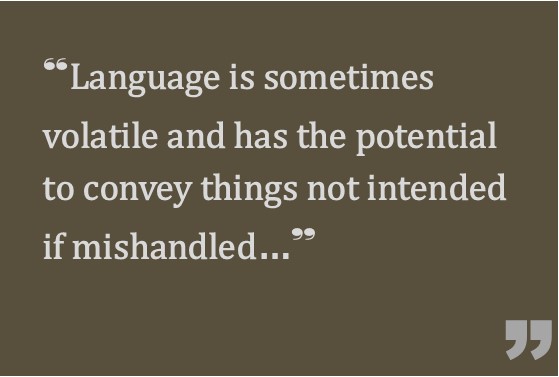PERSPECTIVE: Consider the Meaning of Language Before You Use It – Or Prepare to Lose
/by Paul Steinmetz A university is a wonderful place to work if you like the energy of young people, smart coworkers who are trained to challenge the status quo, and the clanging excitement that the combination creates. You will also notice that the inhabitants of universities and colleges sometimes get themselves knotted up in problems that others don’t face, and they often involve the use of language.
One reason for these issues is that there are a lot of constituencies of higher education, and trying to please them all might be impossible.
Complicating the situation, colleges and universities are often at the forefront of trends in lifestyle and other thinking, which means the words we use to describe these new things are not well defined or accepted. It’s very easy to be well-meaning and yet upset someone.
Finally, you have professors who are very definite in their opinions and students who are enthusiastic in their challenge of such opinions.
The occasional result: chaos, misunderstanding and anger.
 Here are a few examples:
Here are a few examples:
At the University of Tennessee at Knoxville, an administrative office published a guide of pronouns that transgender people might prefer. The list included ze and hir or zir instead of he/she and her or him. Xe and xem would take the place of they and them.
The education trade journal Inside Higher Ed reported that the guide “created a political uproar in the state.” The university president ordered the guide removed from the UT website, saying, “The social issues and practices raised by the Office for Diversity and Inclusion are appropriate ones for discussion on a university campus. However, it was not appropriate to do so in a manner that suggests it is the expectation that all on campus embrace these practices.”
At Washington State University, a professor wrote a syllabus that banned the use of certain words in class and promised punishment to any students who used the words.
From the syllabus:
“Use of racist, sexist, homophobic, transphobic, xenophobic, classist or generally offensive language in class or submission of such material will not be tolerated. (This includes ‘The Man,’ ‘Colored People,’ ‘Illegals/Illegal Aliens,’ ‘Tranny’ and so on — or referring to women/men as females or males.)”
The university administration acknowledged that the professor was attempting to provide a safe and supportive learning environment for everyone. But it pointed out that the syllabus probably violates the First Amendment and ordered all professors “to ensure that students’ right to freedom of expression is protected along with a safe and productive learning environment.”
Finally, you might think that the definition of genocide is clear-cut, but it’s not. Sacramento State University in California is the most recent institution to teach us this.
A sophomore there says her professor threatened to kick her out of class after she allegedly challenged his statement that the term “genocide” wasn’t appropriate for U.S. settler and government actions against American Indians.
Again according to a report in Inside Higher Ed, the professor allegedly said that genocide implies intention and, in his opinion, most native people were killed by European diseases.
The student said she was “enraged” by that statement and a couple of days later she debated the professor in class and began reading out loud the United Nations’ 1948 definition of genocide. The professor asked her to stop, inviting her to talk to him after class rather than “hijack” his lesson. Social media and bloggers reported on the confrontation and the university is investigating exactly what happened in the classroom. (The Inside Higher Ed article offers examples of the many variables considered in deciding what is and what isn’t considered genocide.)
Although none of these situations occurred at the university where I work, I pay attention to them because it would be my task, along with many others, to advise on a response to such an uproar should it happen here.
As a professional writer and public relations practitioner, I often say that anticipating problems and addressing possible issues is usually better for an organization, and individuals, than moving ahead without thinking about the consequences of words. Language is sometimes volatile and has the potential to convey things not intended if mishandled. My other advice is that, when about to engage in potentially controversial activity, you should always let the boss know what you are doing. He/she/ze might later backtrack, but at least you have communicated thoughtfully and clearly. And that is what is important.
________________________________________________
Paul Steinmetz is director of Public Affairs & Community Relations at Western Connecticut State University. As the founder of Writing Associates, he consults on writing issues for businesses and individuals. If you want to discuss a writing issue, contact him at paul@paulsteinmetz.com.
PERSPECTIVE commentaries by contributing writers from across the state appear each Sunday on Connecticut by the Numbers.






























